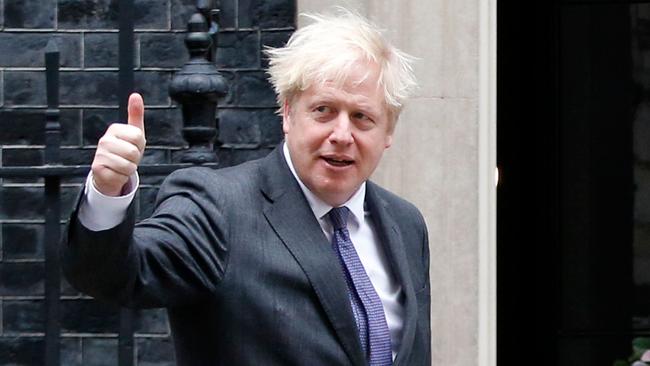
She didn’t bother to mention neither New Zealand nor Canada had been invited to present — although in all likelihood she thinks that these countries should be awarded elephant stamps because they have committed to net-zero emissions by 2050, and Saint Jacinda and Justin have both declared climate emergencies.
You see, committing to net-zero emissions by 2050 is the sine qua non for admission to the Global Deep Green Club of acceptable country behaviour. Without that commitment, people like Steggall will continue to scoff at her own country.
Call me old-fashioned, but I rate deeds much more highly than words. And vague intentions without a plan should just be dismissed. They might get you a speaking engagement at some intensely political shindig — but the rubber will really hit the road when it comes to specifying exactly how a country actually intends to achieve its net-zero emissions by 2050.
So let’s take a look at the facts. Between 2005 and 2018, Australia reduced its emissions by 13 per cent. Across the ditch, New Zealand’s emissions went up by 4 per cent, and this was achieved using some fancy accounting sidesteps involving forestry. Canada’s emissions over this period fell by a mere 2 per cent.
You will be interested to know that China was given a speaking part at the climate shindig even though it’s the biggest emitter of carbon dioxide in the world and its emissions rose by close to 70 per cent between 2005 and 2018.
Somehow it’s OK for China to be commissioning multiple new coal-fired power plants while Steggall and her band of like-minded politicians — think Matt Kean, Lily D’Ambrosio, Annastacia Palaszczuk — want to accelerate the closure of coal-fired power plants in Australia.
The political leadership in China has been able to hoodwink the rest of the world by committing to net-zero emissions by 2060 while cashing in on the induced renewables boom in the rest of the world by providing almost all of the equipment. That’s global climate politics for you.
Back in Australia, the Morrison government has walked away from using the Kyoto carry-over credits to meet our Paris agreement target of a reduction of between 26 and 28 per cent by 2030 from 2005 levels. The degree of hypocrisy of some other countries about the use of these credits has been breathtaking. The countries that objected most strongly have no credits to use because they failed to meet their Kyoto targets — Canada being the standout. But it turns out Australia won’t have to use the credits because it only needs to reduce emissions by 56 million tonnes — annual emissions are about 540 million tonnes — by 2030.
The poster child for the Global Deep Green Club is Boris Johnson, Prime Minister of the UK. Having stumbled badly with his response to COVID-19 — the UK has one of the worst records in the world — and seemingly unable to secure a Brexit deal, he has used a look-over-there tactic to impress the doubters with his 10-point plan to achieve net-zero emissions by 2050, if not before.
“Imagine Britain when a Green Industrial Revolution has helped to level up the country and British towns and regions — Teesside, Port Talbot, Merseyside and Mansfield — are now synonymous with green technology and jobs,” Johnson waxed lyrically recently.
The reality is quite different. The UK is effectively a financial services hub centred on London with very little economic activity elsewhere. It pretends that burning imported woodchips is a form of renewable energy and relies on importing electricity from Europe when the wind dies down, which it has done recently. Without cheap gas from the North Sea — which will run out in the coming decades — the UK would be even more of a basket-case than it is.
Part of Boris’s plan involves additional investment in offshore wind turbines, directly or indirectly using taxpayer money, to power “every household in the UK” — some of the time, at least.
Evidently, Poms will be happily walking and cycling everywhere, eating less meat and drinking little milk. Gas stoves will be outlawed from 2023, as will cheap and reliable gas-powered central heating. Heat pumps at four to five times the cost of current forms of heating will be all the rage in Boris’s nirvana.
From 2030, only electric and some hybrid vehicles will be allowed to be sold, even though this transition will be costly and have a tiny impact on emissions. And did I mention the planting of 30,000 additional hectares of forest a year, which will be a challenge in a country the size of the UK?
Of course, Boris will be long gone before most of these radical measures are ever implemented — if they are. However, the tail of committed public money for the green cause — about £50bn ($88bn) a year — will be difficult to wind back. In the meantime, the unelected Climate Change Committee, set up by then prime minister Gordon Brown in 2008, will continue to churn out unsubstantiated nonsense about the economic benefits from this forced transition. It is very reminiscent of several of the bodies in Australia that peddle the same sort of predictable piffle.
If this is what it takes to be invited to present at an international climate talkfest, then the price is too high. The Morrison government is wise to adopt a measured and practical approach to reductions rather than be pushed around by loud-mouthed members of the Global Deep Green Club to adopt the latest fads.




Last week, independent member for Warringah Zali Steggall was all in a tizz about Australia’s failure to be invited to present at a virtual climate jamboree sponsored by the UK, France and the UN held this past weekend.